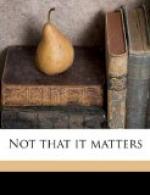Yes; I suspect that a good many diaries record adventures of the mind and soul for lack of stirring adventures to the body. If they cannot say, “Attacked by a lion in Bond Street to-day,” they can at least say, “Attacked by doubt in St. Paul’s Cathedral.” Most people will prefer, in the absence of the lion, to say nothing, or nothing more important than “Attacked by the hairdresser with a hard brush”; but there are others who must get pen to paper somehow, and who find that only in regard to their emotions have they anything unique to say.
But, of course, there is ever within the breasts of all diarists the hope that their diaries may some day be revealed to the world. They may be discovered by some future generation, amazed at the simple doings of the twentieth century, or their publication may be demanded by the next generation, eager to know the inner life of the great man just dead. Best of all, they may be made public by the writers themselves in their autobiographies.
Yes; the diarist must always have his eye on a possible autobiography. “I remember,” he will write in that great work, having forgotten all about it, “I distinctly remember”—and here he will refer to his diary—“meeting X. at lunch one Sunday and saying to him ...”
What he said will not be of much importance, but it will show you what a wonderful memory the distinguished author retains in his old age.
Midsummer Day
There is magic in the woods on Midsummer Day—so people tell me. Titania conducts her revels. Let others attend her court; for myself I will beg to be excused. I have no heart for revelling on Midsummer Day. On any other festival I will be as jocund as you please, but on the longest day of the year I am overburdened by the thought that from this moment the evenings are beginning to draw in. We are on the way to winter.
It is on Midsummer Day, or thereabouts, that the cuckoo changes his tune, knowing well that the best days are over and that in a little while it will be time for him to fly away. I should like this to be a learned article on “The Habits of the Cuckoo,” and yet, if it were, I doubt if I should love him at the end of it. It is best to know only the one thing of him, that he lays his eggs in another bird’s nest—a friendly idea—and beyond that to take him as we find him. And we find that his only habit which matters is the delightful one of saying “Cuckoo.”
The nightingale is the bird of melancholy, the thrush sings a disturbing song of the good times to come, the blackbird whistles a fine, cool note which goes best with a February morning, and the skylark trills his way to a heaven far out of the reach of men; and what the lesser white-throat says I have never rightly understood. But the cuckoo is the bird of present joys; he keeps us company on the lawns of summer, he sings under a summer sun in a wonderful new world of blue and green. I think only happy people hear him. He is always about when one is doing pleasant things. He never sings when the sun hides behind banks of clouds, or if he does, it is softly to himself so that he may not lose the note. Then “Cuckoo!” he says aloud, and you may be sure that everything is warm and bright again.




